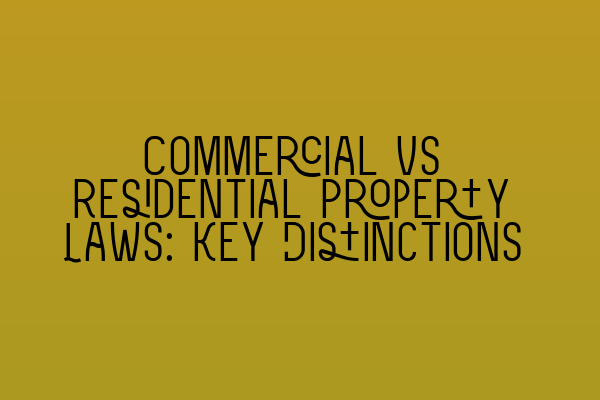Commercial vs Residential Property Laws: Key Distinctions
When it comes to property laws, there are significant distinctions between commercial and residential properties. Whether you’re a property investor, landlord, or tenant, understanding these key distinctions is essential for navigating the legal landscape effectively. In this article, we will explore these differences in detail and shed light on the unique considerations for each type of property.
1. Ownership and Use
Commercial properties are primarily used for business purposes, such as offices, retail stores, industrial units, or warehouses. On the other hand, residential properties are used for living purposes, including houses, apartments, or condominiums.
Commercial property ownership often involves more complex legal structures, such as partnerships, corporations, or limited liability companies. Residential properties, on the other hand, are typically owned by individuals or families.
2. Landlord-Tenant Relationship
The landlord-tenant relationship differs significantly between commercial and residential properties. In commercial leases, the terms and conditions are often more negotiable, and the leases are typically longer-term. Commercial leases also tend to include provisions for rent increases, maintenance responsibilities, and recourse for defaulting on the lease.
Residential leases, on the other hand, are subject to more stringent regulations designed to protect the rights of tenants. Laws regarding security deposits, eviction processes, habitability standards, and lease renewals vary widely based on local jurisdictions. It is essential for both landlords and tenants to familiarize themselves with the specific regulations in their area.
3. Financing and Mortgages
Commercial and residential properties also differ in terms of financing options and mortgage terms. Commercial properties often require larger down payments and higher interest rates due to the higher risks associated with commercial ventures. Lenders typically assess the property’s potential income-generating capacity and the creditworthiness of the borrower.
Residential properties, especially owner-occupied homes, generally have more favorable financing options. These include lower interest rates, government-backed loan programs, and the ability to deduct mortgage interest on personal income taxes.
4. Zoning and Land Use Restrictions
Zoning laws and land use restrictions play a significant role in both commercial and residential property laws. Zoning laws regulate how land can be used within specific geographic areas. Commercial properties may be subject to more stringent zoning regulations, such as restrictions on noise levels, operating hours, or types of businesses allowed.
Residential properties are subject to zoning laws designed to maintain the integrity of residential neighborhoods and protect the quality of life for residents. These laws may include restrictions on building height, lot size, and density.
5. Lease and Contract Negotiation
Commercial property leases often involve more complex negotiations and contract drafting. Since commercial leases can span several years, they typically include detailed provisions regarding rent escalation, maintenance responsibilities, insurance requirements, and dispute resolution.
Residential leases, although usually shorter-term, also require careful consideration. Tenants need to understand their rights and responsibilities, including the payment of rent, repair obligations, and the terms for lease termination.
Conclusion
Understanding the key distinctions between commercial and residential property laws is crucial for anyone involved in property ownership, investment, or tenancy. Whether dealing with leases, contracts, financing, or zoning regulations, the nuances of each sector are significant and can have substantial legal implications.
If you need assistance with property law matters, including commercial or residential properties, feel free to contact SQE Property Law & Land Law. Our team of experienced property law solicitors understands the complexities of both commercial and residential transactions and can provide you with expert advice and assistance tailored to your specific needs.
Related Articles:
– Parties in a Contract: Rights and Responsibilities
– Unveiling Duress and Undue Influence in Contracts
– Essentials of Consideration: Understanding the Backbone of Contracts
– Damages in Contract Law: Assessing Financial Compensation
– Express and Implied Terms in Contracts: Decoding Agreement Components
